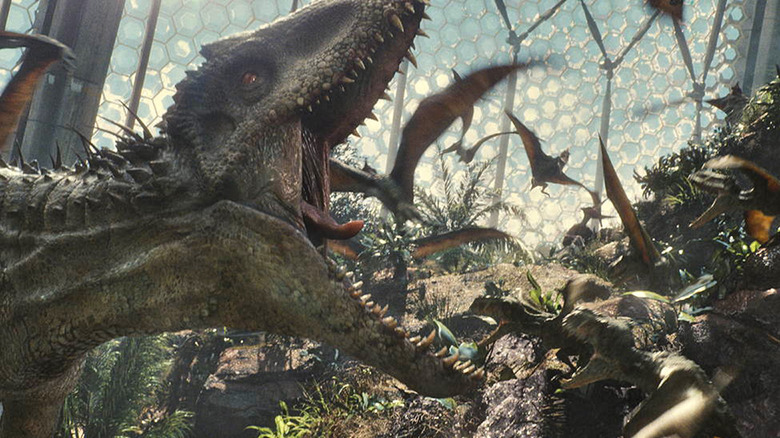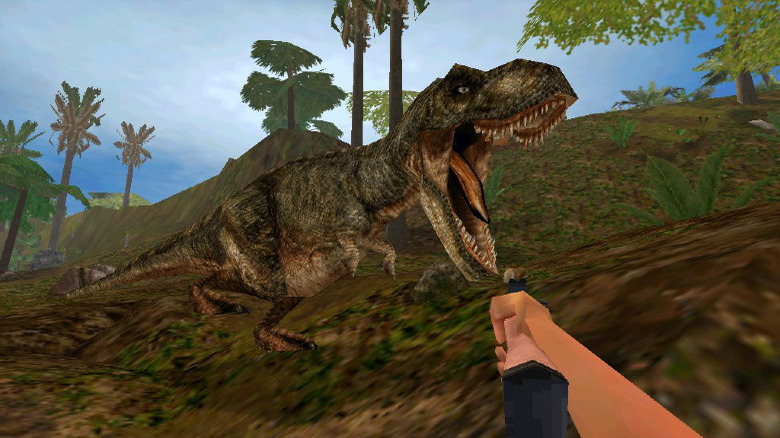Jurassic World Was Originally Going To Be A Video Game Before It Became A Movie
Life, ah, finds a way. And so does the "Jurassic Park" franchise, although it hasn't always been easy. After the first three films in the dino-franchise steadily rolled out from 1993 through 2001, the fourth movie would go through an arduous pre-production process that included a notoriously bizarre early script draft featuring, among other things, dinosaur/dog hybrids. It would ultimately come to pass in 2015 under the title "Jurassic World," a legacy sequel that centers on the titular theme park (a place literally built on the remains of John Hammond's original biological reserve on Isla Nublar). But what if I were to tell you "Jurassic World" didn't start as a film at all; it was the title of a video game pitch conceived by Seamus Blackley, the creator and designer of the Xbox? Strap in, folks, it's time to go back in time into "Jurassic Park" history.
In 1998, Blackley teamed up with DreamWorks Interactive to produce "Trespasser." A video game spinoff of 1997's "The Lost World: Jurassic Park," the title focuses on Anne (voiced by Minnie Driver), a woman who emerges as the sole survivor of a plane crash on Isla Sorna, aka Site B (the island where Jurassic Park's dinosaurs were bred before being moved to Isla Nublar). It was, uh, not a critical success. Computer Gaming World "honored" the game by declaring it the "Coaster of the Year" due to its "monumentally cumbersome interface and a physics-based engine that slapped down the slightest hint of fun."
Writing about "Trespasser" in a thread on Twitter, Blackley explained:
"I had been working on locomotion physics, which was really new, and the only way [DreamWorks] would fund a game with it was for me to make a 'Jurassic Park' title. So I did, and I led a brilliant team straight into hell."
Enter Bill Gates... and Steven Spielberg
While he was promoting "Trespasser," Seamus Blackley crossed paths with Bill Gates, who was the CEO of Microsoft at the time. Having managed to impress Gates with the game's "physics and rendering," Blackley took a job at the latter's company in 1999. "I got a lot of death threats, I figured I'd never work again, and all that," he wrote on Twitter, once again reminding everyone that toxic fandom is nothing to trivialize or play down. As such, his plan was to "hide out deep inside Microsoft and vanish from history." How'd that work out for him? He went on to develop the Xbox in 2001, innovating the gaming industry along the way. "I suck at hiding," Blackley admitted.
Having come to realize "the thing stopping great games from happening (early 2000s) was financing" from his time working on the Xbox, Blackley left Microsoft in 2002 to co-found a game finance company, Capital Entertainment Group, with one of his former co-workers, Kevin Bachus. This, in time, would lead to him being "sucked" into Creative Artists Agency (CAA), "the mammoth talent agency, where they promised to teach me the dark arts of STRUCTURED FINANCE FOR ENTERTAINMENT," Blackley explained.
Why does this matter? Well, you see, CAA also counted a fellow by the name of Steven Spielberg as one of its clients at the time, which led to him and Blackley crossing paths on more than one occasion. Spielberg wasn't a fan of Blackley being bogged-down in the world of financing and IP ownership, either. "Steven would always say 'I don't like you in this job. Why are you doing this job,'" Blackley added. So Spielberg spoke to the CAA's head and arranged for Blackley to develop a new "Jurassic Park" video game for Universal instead.
Welcome to Jurassic World
Upon being contacted by Universal and Kathleen Kennedy, back when she was Steven Spielberg's steadfast producer, Seamus Blackley teamed up with some "incredibly talented artists and coders" to assemble a pitch for a game titled "Jurassic World," complete with gameplay design, art design, and a story bible. That story entailed the dinosaurs of Isla Sorna escaping out into the world and humans having to come to terms with these giant prehistoric creatures living among them. "My thesis was that audiences wanted to KNOW the dinosaurs more than to kill them," Blackley explained. He elaborated on this, writing:
"We had brought these earthlings back, sentient creatures, individuals. And so we need to learn to share, even to be friends. In our game, the humans that want to eliminate the dinosaurs are the enemies. The dinosaurs become our allies. By saving them, we save ourselves."
Sound familiar? Yes, it seems Blackley was pushing for a story about humans and dinosaurs struggling to co-exist long before that served as the plot for the third and final "Jurassic World" film, "Jurassic World Dominion." It sounds like a promising setup for a video game, or so Spielberg felt (Kennedy told Blackley he "loved" it). Sadly, just as hiring for the game had begun, a change in leadership at Universal derailed the whole thing, and Blackley learned through producer Frank Marshall (who is married to Kennedy and whom Blackley described as "the nicest guy in Hollywood") that a "Jurassic World" film would be moving forward instead of the game. He added:
"There was a movie in the works, and the cancellation of the game meant they got everything. Honestly this was the best outcome possible."
The reviews for "Dominion" might beg to differ with that sentiment — but that's another story.

